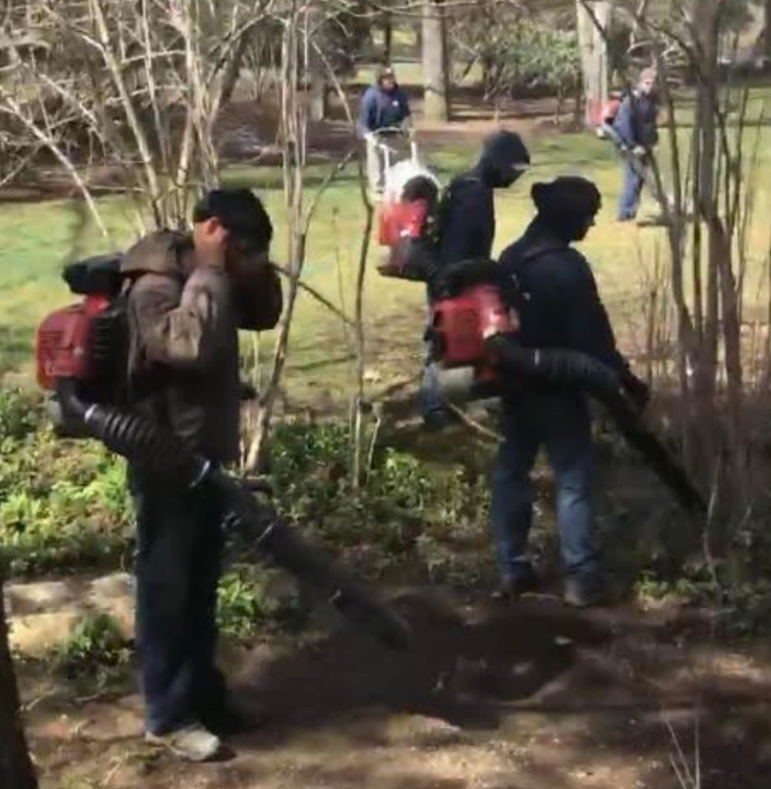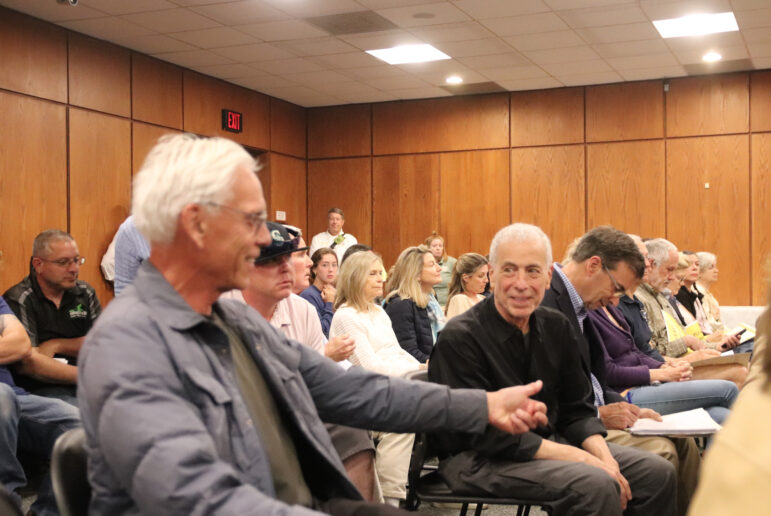At their meeting on Monday Greenwich’s Board of Health voted against a proposed ordinance from Quiet Yards Greenwich who have argued that gasoline powered leaf blowers are a health hazard to residents due to their ear-splitting noise and air pollutants.
Their proposal sought a phased approach to the decreased use of gas leaf blowers over several years and encourage their replacement with electric blowers.
The changes would have applied to residential lots only – not golf courses or town property – and would have allowed a year for education and awareness. Then, in year 2, 3, and 4 the window within which gas blowers are allowed would diminish to the first two weeks in April for spring cleanups and one month in fall for leaf removal, from Nov 15 to Dec 15.
The proposed ordinance was modeled after one in neighboring Bedford, NY.
“They claim that the use of gas powered leaf blowers is an immediate health hazard. However, they are proposing to allow their use several months out of the year. We do not recognize a health hazard on a part-time basis.”
– Dr. Sarah Gamble, chair of the Board of Health subcommittee on gas powered leaf blowers
First Selectman Fred Camillo, whose office overlooks the town hall lawn that is now managed by a zero-emissions electric robotic mower, had given full support to the Quiet Yards Greenwich proposal.

Greenwich Health Department director Caroline Biasley gave an air pollution report to put the gas powered leaf blower proposal into historical context.
She said the town had come a long way in combating air pollution, having remediated the Cos Cob power station, shut down the incinerator at Holly Hill and put an end to the residential practice of burning leaves.

the Cos Cob Power Plant was was built in a residential neighborhood in 1907 to provide electricity to the railroad. In 1989 the town paid $2.00 for the Mianus Pond, which was part of the power plant operation at the time.
“We thought we were getting a bargain,” Baisley said. “It ended up to be not such a good investment because there are restrictions on land development and the contamination of the ground in and around the power plant.”
“As the plant deteriorated, a severe public health threat emerged into the surrounding community with airborne asbestos and other materials being released.”
In 2000, under order of the EPA, asbestos abatement was required to take place. Finally, the demolition took place.
“Today with all these three hazards gone, Greenwich has restored their air quality to the best of lower Fairfield County,” Baisley said.
Still, Connecticut is often referred to as “the tailpipe of the nation,” and Baisley noted the state of CT had recently unveiled a Geospatial Measurement of Air Pollution (GMAP) vehicle designed to travel anywhere in the state to detect and record air quality data in real time.
The Ford Explorer Hybrid has high-precision GPS, instruments to detect and record 16 different air pollutants. It cost $300,000, funded in large part by an EPA grant.
Baisley said while there were no longer polluting depot docks in town, recreational boats and luxury vessels emitted pollution.
Further she noted the railroad, I-95, the Merritt Parkway and I-287, as well as Westchester Airport were all sources of air pollution.
“What am I saying? There is pollution. It comes from various sources. It doesn’t just come from the gas operated leaf blowers,” Baisley said. “We need to control a lot of sources of not only air pollution, but also noise in our community.”
Ultimately, she said that given all the sources of air pollution, it did not make sense to single out a particular piece of equipment. She noted leaf blowers were just one tool among the broad category of domestic power tools.

Subcommittee chair Dr. Sarah M. Gamble noted that at the May Board of Health meeting landscapers commented on the proposal. Among their concerns was that electric blower technology was still evolving, that commercial batteries needed frequent recharging, and that leaves didn’t all fall within the 6-8 week period specified by the ordinance.
Gamble said her subcommittee had reviewed QYG’s 80-page white paper.
“We admit that yes there are characteristic noises of gas leaf blowers – they have a loud, predominantly low frequency component. They do travel over long distances and they can penetrate windows and structures. Penetration depends on the construction,” she said. “What we cannot find is any literature demonstrating that the public standing at certain distances for short periods of time, especially if listening to something being used on a neighbor’s property – we found no data about that.”
Dr. Gamble said the National Institute of Health and OSHA recommendations on noise exposure – including time limits and decibel levels – were primarily to prevent job-related hearing loss, not for general pubic exposure.
Gamble listed other sources of noise pollution in Greenwich, including the Greenwich Town Party, Apple ear pods, lawnmowers, weed whackers, fireworks and hair dryers.
Gamble said her subcommittee recommended rejecting the QYG ordinance.
“They claim that the use of gas powered leaf blowers is an immediate health hazard. However, they are proposing to allow their use several months out of the year,” Gamble said. “We do not recognize a health hazard on a part-time basis.”
Still, Gamble said the subcommittee believed changes to the existing noise ordinance were fully warranted, and that the Board of Health should consider making changes to Greenwich’s existing noise ordinance to further reduce the general noise levels in town.
Specifically, the subcommittee recommended a public re-education campaign for residents and commercial yard/lawn/tree property maintenance professionals that would include social media, information on the town website, printed materials, and efforts of volunteers.
She said education should also focus on homeowners to encourage them to take responsibility for the professionals they hire so that they adhere to the noise ordinance.
“We believe this re-education program will enhance the ability for Greenwich Police Department’s enforcement once people understand exactly what restrictions are in place,” Gamble said.
They also recommended a registration program for landscape professionals, with associated fees.
The registration program would require, for example, the name of the business be displayed on both sides of the vehicle. Registration decals would be displayed to help people report violations and enhance adherence to the existing noise ordinance.
“Please allow us as a subcommittee to continue to work on this,” Gamble continued, noting that efforts in other towns and hamlets do not translate as boilerplate to Greenwich, where property sizes ranged from less than 1/4-acre to 20 acres. Also the town itself is responsible for maintaining vast acreage. And, she noted there are numerous golf clubs, schools, churches and commercial properties that need to be taken into consideration.
She said her subcommittee would also consult DEEP which has a noise control division with a template on offer.
Dr. Gamble said the town’s existing noise ordinance included both restrictions and penalty fines for violations.
The restrictions allow use of gas blowers from Monday to Friday, 8:00am-6:00pm; and Saturdays, Sundays and holidays, 9:00am-3:00pm. At all times of the year only one gas blowers is allowed on residential lots 1/4 acre or less. Between Memorial Day and Labor day, on lots of all sizes, only one gas operated leaf blower can be used. During storm related events, gas powered leaf blowers may be used in recover from a storm.
“I’m huge on the holiday restriction,” Gamble said, mentioning Memorial Day specifically.
Gamble recommended extending the restrictions for gas leaf blowers as well as other domestic power tools and construction tools that she said make just as much noise, to further limit to time of day or days that they can be used.
“We believe this is a solid approach to reducing the overall noise levels in the community,” she said.

Board of Health Chair Joel Muhlbaum called the vote on the subcommittee’s recommendation to reject QYG’s proposal, and to instead implement a bona fide registration program for all landscaping professionals who use gas leaf blowers to be managed and overseen by the Dept of Health, to implement a structured re-education program, and lastly have the subcommittee continue to review ordinances in Fairfield County and the State DEEP Noise control regulations with an eye to further restrictions in the existing noise ordinance.
Muhlbaum said there would need to be “buy-in” from Greenwich Police Dept and the chief of police because they would be in charge of enforcing the ordinance, but also he said residents will need to choose reputable service providers.
“That’s not going to be an easy task,” he said. “Folded into this registration program that over the summer and early fall, the Director of Health can come up with a working program to deal with registration and education.”
The vote was unanimous, 6-0, with Joel D. Muhlbaum, Sarah Madden, Dr. Gamble, Maryann Ramos, Anne Fountain, Lauren O’Keefe voting.
On Tuesday, Svetlana Wasserman from QYG said said the Board of Health had abdicated their responsibility to safeguard the health of the community.
Wasserman recalled that back in 1992, Greenwich residents started a group called Project Quiet Yards that called on the town to protect residents from the harms caused by gas leaf blowers.
“The Health Director at the time, Dr. James Lieberman, deferred and said that the town’s position would be one of educating people,” Wasserman said, adding that 30 years later, in 2023, the Board of Health rejected the pleas of hundreds of residents and once again recommended education over action.”
“The only thing that education has accomplished in 30 years is that gas leaf blowers are being used more prolifically, for more months of the year, and there are more residents demanding change.”
See also:
Pressure Mounts on Board of Health at Hearing on Expanded Gas-Powered Blower Restrictions May 23, 2023
xxxx